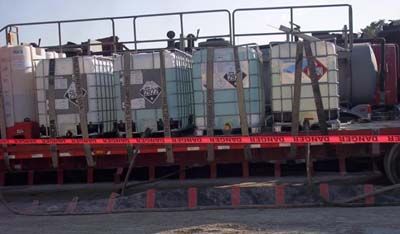Rig Up
Possible Solutions:
- Preplan equipment locations and use a spotter to position equipment out of the fall lane of the derrick and upwind of vents, vapor sources and gas sources.
- Conduct a pre-job inspection to identify and eliminate or correct hazardous work surfaces.

Chemical additive truck. Photo credit: Eastern Research Group.
- Use appropriate fall protection equipment.
- Require all non-essential personnel to stand clear of the work zone.
- Secure all elevated lines.
- Use proper hand and body positioning.
- Provide adequate bonding and grounding for blending, pumping and sand transfer equipment.
- Use hose covers or shielding for transfer or suction lines containing flammable liquids to prevent them from being ruptured resulting in fires or explosions.
- Cap unused fill ports (e.g., cam lock caps) on sand movers.
- Reduce the drop height between the sand transfer belt and T-belts and blender hoppers.
- Apply fresh water to roads and around the well site to reduce silica dust.
- Enclose points where silica dust is released. Use local exhaust ventilation to collect silica-containing dusts and prevent dust escape. Install dust collection systems onto machines or equipment that release dust.
- Where possible, use enclosed cabs or booths. Consider providing operator cabs and booths with HEPA filters and climate controls to protect workers from silica dust and environmental extremes.
- Replace proppant transfer belts with screw augers.
- Ensure that workers follow the safe handling procedures found in Safety Data Sheets.
- Conduct personal protective equipment assessments and require employees to wear prescribed personal protective equipment (PPE) including respiratory and hearing protection.
- Use mechanical lifting aids, proper lifting techniques and team lifting where appropriate.
Knowledge Check Choose the best answer for the question.
2-3. Why are enclosed cabs or booths and HEPA filters recommended for some workers performing fracking operations?
You forgot to answer the question!
